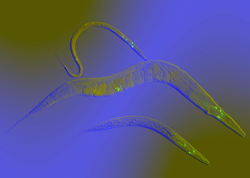Worming our way through cancer
Arguably one of the most elusive diseases in medical history is cancer. It is a baffling disease that results from diverse changes in the genome - the entirety of an organism's hereditary information. So far, some 300 genes have been identified as cancer-causing ones, with many more crucial genes needing to be identified in order to develop effective drug treatments. While many research teams around the world are mapping cancer genes, many of these studies have not been validated. The mapping or 'sequencing' can be done on other organisms and the results can be used to understand cancer in humans. One of these organisms is Caenorhabditis elegans, a microscopic roundworm which lives in the soil. Because of its simple cell structure, quick reproductive abilities and transparent nature, C. elegans is perfect for studying cancer. It is ideally suited for identifying the combination of defects in the genome. With this in mind, the 'Modelling cancer in Caenorhabditis elegans' (Canceromics) project has set out to pinpoint the intricacies of cancer genes in C. elegans and report on them. This four-year initiative has been fully funded by the EU, and ends in October 2011. The project's team has participated in several conferences on the subject and unveiled its findings so far, although many more results are expected to emerge at later stages. Eventually, the project hopes to produce a functional map for cancer genes that will shed light on how cancer develops and what treatments could be effective against it.







